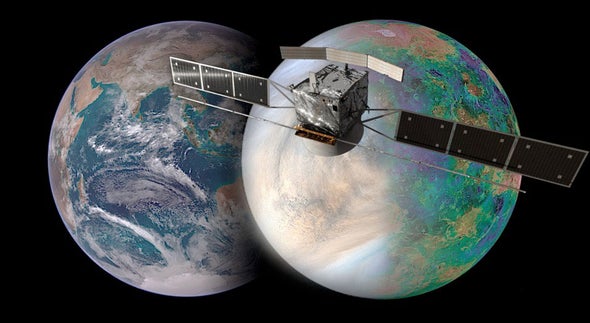
Venus scientists have long complained that the planet wasn’t getting its due in robotic investigators. But those days are over: space agencies have announced three new missions to Earth’s mysterious twin in just over a week.
On June 2, NASA Administrator Bill Nelson announced that the agency would pursue two new Venus missions dubbed DAVINCI+ and VERITAS, aiming to launch the spacecraft between 2028 and 2030. Today (June 10), the European Space Agency (ESA) joined the rush to Venus, announcing that it would launch a mission dubbed EnVision to the planet in the early 2030s.
“A new era in the exploration of our closest, yet wildly different, Solar System neighbour awaits us,” Günther Hasinger, ESA’s director of science, said in a statement. “Together with the newly announced NASA-led Venus missions, we will have an extremely comprehensive science programme at this enigmatic planet well into the next decade.”
The mission was chosen over an astrophysics project called Theseus, which would have studied very distant gamma-ray bursts and other transient events, with the goal of understanding the life cycle of the very first stars, according to ESA.
The new mission won’t be Europe’s first visit to our neighboring world: ESA’s Venus Express spacecraft orbited the world from 2005 to 2014, studying the planet’s thick atmosphere, which is rich in carbon dioxide.
EnVision will also orbit Venus, but its instruments will be able to get a deeper look at the planet than those onboard Venus Express did. The spacecraft’s tools will include a sounder to investigate layers within the planet, spectrometers to analyze gases in Venus’ atmosphere and compounds on its surface, a radar instrument to map the planet’s surface, and a radio science experiment that will probe the planet’s structure and gravity field, according to ESA.
Although the project is led by ESA, the spacecraft’s radar instrument will come from NASA. “EnVision’s VenSAR will provide a unique perspective with its targeted studies of the Venus surface, enriching the roadmap of Venus exploration,” Adriana Ocampo, EnVision program scientist at NASA, said in a NASA statement.
Meanwhile, NASA’s VERITAS mission (short for Venus Emissivity, Radio Science, InSAR, Topography and Spectroscopy) will generate a global map of the topography of Venus. The data will be a vital upgrade compared to what we have from NASA’s Magellan mission, which used a much older version of the technology to map Venus between 1989 and 1994.
DAVINCI+ (Deep Atmosphere Venus Investigation of Noble Gases, Chemistry and Imaging) will be the only one of these new missions to venture through Venus’ atmosphere. The spacecraft includes a main orbiter plus a probe that will travel all the way down through the planet’s atmosphere to its surface, gathering measurements of how the atmosphere changes with depth.
EnVision will launch after the two NASA projects, with ESA officials evaluating Ariane 6 launch windows in 2031, 2032 and 2033. The spacecraft will then take 15 months to reach Venus and another 16 months to reach its final orbit.
Taken together, the three new missions will be a powerful tool for scientists looking to better understand how Earth and Venus started out so similar but became such different worlds, Tom Wagner, NASA’s Discovery Program scientist, said in the NASA statement.
“The combined results of EnVision and our Discovery missions will tell us how the forces of volcanism, tectonics and chemical weathering joined together to create and sustain Venus’ runaway hothouse climate.”
Copyright 2021 Space.com, a Future company. All rights reserved. This material may not be published, broadcast, rewritten or redistributed.
"time" - Google News
June 12, 2021 at 07:00PM
https://ift.tt/3cEBxfY
Venus Wins Stunning Third New Mission, This Time from Europe - Scientific American
"time" - Google News
https://ift.tt/3f5iuuC
Shoes Man Tutorial
Pos News Update
Meme Update
Korean Entertainment News
Japan News Update
Bagikan Berita Ini














0 Response to "Venus Wins Stunning Third New Mission, This Time from Europe - Scientific American"
Post a Comment